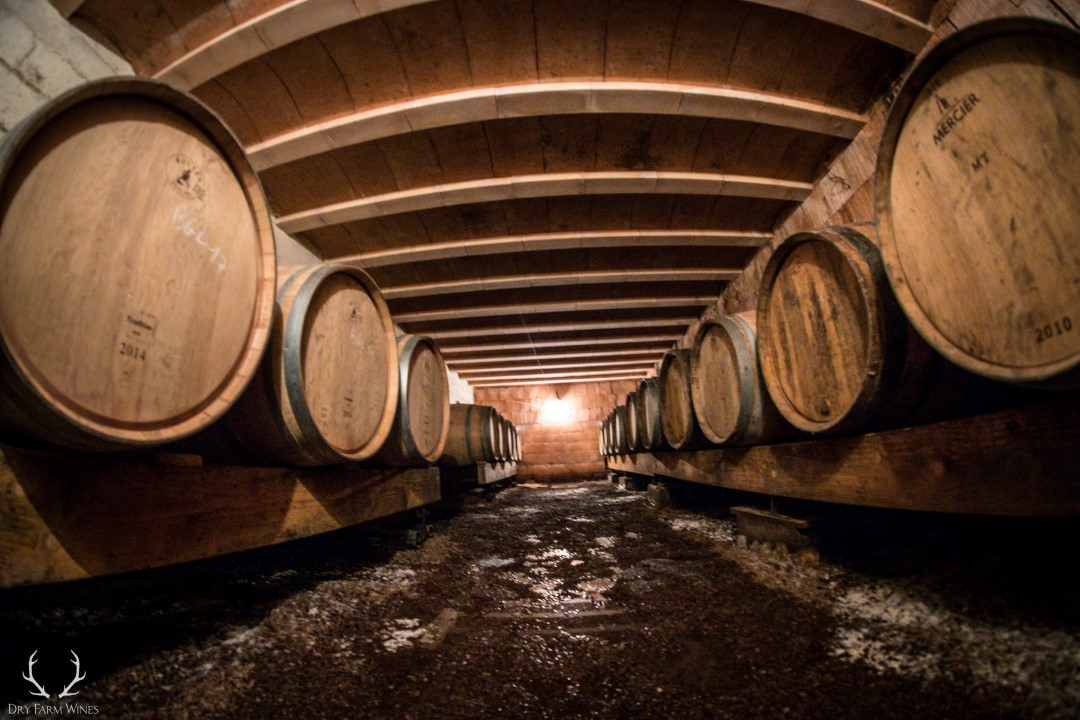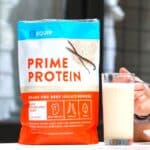One of the things that most people miss when they switch to a low-carb or ketogenic diet is a nice glass of wine at night with dinner. It helps you relax and unwind after a long day. Not to mention, there are some health benefits of drinking wine.
The problem is that most conventional wines are full of unnecessary sugar and carbs. This means that it was one of the first beverages you had to cut out of your diet when you started to eat low-carb.
However, you don’t have to cut wine entirely from your diet. You just have to know which ones to drink.
Let’s talk about why Dry Farm Wines is the most recommended brand in the low carb and health communities.
Quick Summary
Right now you can join their wine club and enjoy an extra bottle for a penny in your first membership order. Go to this page to claim this special deal!
You can learn more about this company’s practice in this video:
If you’re on the ketogenic diet and miss drinking wine as much as we do, then read on to learn more about the only type of wine you should ever drink again.
Health Benefits of Natural Wine
Have you ever noticed that there is not a nutrition label on the back of alcohol like there is with most food products? That’s because wine is regulated by the Alcohol and Tobacco Tax and Trade Bureau (TTB) and not the FDA.
Wine manufacturers aren’t required to put a nutrition label on wines, which makes it hard to know what’s in it.
Natural wine has plenty of health benefits. It’s free of all the contaminants that you find in conventional wine. It’s also virtually sugar-free.
Red wine is a good source of resveratrol, which is an antioxidant found in grapes that has been shown to have powerful anti-inflammatory properties (1).
Studies have shown that resveratrol has the following benefits (2):
- Helps improve blood flow, which is beneficial for your heart and circulatory system
- Protects against oxidative damage in the pancreas and the liver
- Helps protect against cell proliferation and breast and renal cancer
- Contributes to weight loss in humans by influencing lipogenesis, lipid storage, insulin signaling, and mitochondrial biogenesis
- Has anti-anxiety-like effects and may help with sleeping disorders
- Boosts the immune system
- Provides behavior support to patients going through withdrawal
- May protect the aging brain against Alzheimer’s disease
- Helps lower blood pressure due to antioxidant abilities
- Has an anti-obesity effect and anti-cancer effect
- Has a neuroprotective effect to combat depression and epilepsy
- Reduces the risk of developing fragility syndrome in the aging population
- Combats the metabolic and vascular effects of a high-sugar diet
- Improves insulin resistance induced by free fatty acids to promote weight control
- Contains antidiabetic and anti-atherogenic effects
- helps protect the kidneys
- May be beneficial against polycystic ovarian syndrome
- May protect against and prevent osteoporosis
- Improves learning and memory in subjects with hypothyroidism
In addition to resveratrol, natural wine contains many other polyphenols, such as procyanidins and ellagic acid, which contain further anti-inflammatory benefits to your favorite drink.
Because natural wine is fermented using only the bacteria that is naturally occurring on grapes, it is less likely to kill off the polyphenols and other sensitive antioxidants that might become damaged during harsh conventional processing used in general wine making.
The wild yeast used in natural wine also helps improve your gut health. In fact, research shows that the bacteria in wine helps protect your brain by strengthening your gut (3).
This is due to the constant communication that your brain and gut have with each other via the vagus nerve. These two areas of your body might be on opposite ends of your body, but they are constantly communicating.
According to one study, wine contains compounds that protect against neuronal death that contributes to Alzheimer’s disease and Parkinson’s disease by passing through your digestive system first (4).
Researchers found that when you drink wine, it leaves behind compounds in your gut referred to as wine-derived human gut metabolites. These metabolites were found to protect human cells under stressful conditions that normally lead to cell death or dysfunction, which is what occurs during the early stages of many neurological diseases.
It’s important to note that the effectiveness of these wine metabolites is only as effective as the overall health of your gut. In other words, the researchers found that your gut microbiota composition is responsible for breaking down these wine metabolites. If your gut isn’t healthy enough to break them down properly, you won’t be able to make use of these metabolites.
Adopting a ketogenic diet that is free from sugar is a great way to improve your gut health. Drinking natural wine can help support your ketogenic goals.

Facts about General Wine
After doing a bit of research on general or conventionally-grown wine, it’s not hard to see why you’re better off giving it up entirely. For starters, the fermentation process that most conventional wine goes through is terrible for you.
Sugar is added to both red and white wine during the fermentation process to influence the taste and give the wine a higher alcohol content. The sugar alone is reason enough to avoid conventional wine, even if you aren’t on a low-carb diet.
You might notice that the alcohol content in natural wine is lower because it doesn’t use sugar to drive the fermentation process. So, what you’re left with is a balanced alcohol content that won’t get you overly buzzed and leave you feeling hungover the next day.
Additionally, the FDA approves the use of 76 different additives in conventional wine, including PVPP, sawdust, sulphur, and fish bladders, just to name a few. Not to mention that most general wines contain monsanto or Round-Up, which is an herbicide that has been linked to cancer.
Many general wines even contain a food coloring agent to enhance the look of their wine and give it a vibrant appearance. These color enhancing agents are known as “mega purple” and “ultra red.” They are an additive that many people think should be listed on the back of a wine bottle to inform them about what they’re drinking.
Most importantly, general wine uses commercial yeast in its wine to speed up the fermentation process. This cheap form of yeast is the reason why so many people get wine headaches or hangovers the day after drinking only a glass or two of wine.
Your wine may also include several forms of fining or clarifying agents to make it appear smooth and polished. You’ll notice a difference in taste and the way you feel right away after drinking a glass of natural wine if you’re used to drinking general wine only.

What Are Dry Farmed Wines?
Dry farmed wines are natural wines that are processed much differently than general wines. They rely on only natural rainfall and experienced caretakers to produce their grapes. For this reason, most dry farmed wines are produced in Europe where rainfall is plentiful.
In fact, irrigation is illegal in some parts of Europe, so the wine farmers there have no other choice but to rely on nature to provide them with the best crop possible. Dry farming has been around for over 10,000 years, but it’s not popular here in the United States because we don’t have the right climate for it.
The dry farming process relies on healthy soil with a good moisture content. This can be achieved by proper tillage, which is a process that forms a layer of dust over the soil so that it retains more moisture.
This allows the soil to act as a sponge and it slowly releases water into the grape vine over time. This process saves approximately 16,000 gallons of water per acre of farmland annually.
Not only is dry farming better for you. It’s better for the environment, too! Plus, the wine tastes better when it’s grown this way. This is because the irrigation process creates bigger grapes but dilutes its flavor. And bigger is not always better, especially when it comes to food.
Another key difference between general wine and its natural counterpart is that natural wine growers do not spray any chemicals on their grapes. They use only the yeast naturally found on the grapes.
Conventional wine growers usually kill this natural bacteria off their grapes when they go through the filtration process and then add GMO strains of yeast to speed up production so that they can make more money quicker.
As you can see, general wine is not focused on providing you with a natural, healthy product. It’s about delivering a product that looks good and gives you a buzz as quickly as possible to turn a profit.
Dry Farmed Wines vs. Commercial General Wines
Here is a breakdown of the primary differences between general/commercial wines and natural wines:
- Plant care: Dry farm wine makers hand pick their grapes from the vine, which is better for the plant and produces a better tasting wine. Because of this care, dry farmed grape vines can live up to 100 years. Conventional winemakers use a machine that uses a rubber belt to beats the sticks of the grape vine until they drop the grape.
- Irrigation: Dry farmed wines are grown in Europe and rely on natural rainfall only. They also use native wild yeast to ferment their wines, which is higher in “good” bacteria.
- Sulfates: Dry farmed wine contains fewer sulfites.
- Pesticide use: Dry farmed wines contain no herbicides or pesticides. They do not use coloring agents or add anything other than grapes to their wine.
- Alcohol content: Alcohol content is lower in dry farmed wines due to the lack of sugar. This means no hangovers the next day!
- Sugar content: Dry farmed wines contain no added sugar. All wines, even white wines, have less than one gram of sugar per liter, which makes them ideal for ketogenic diets.
- Purity: Dry farmed wines are lab tested to make sure all wines are virtually sugar-free and contain no preservatives, including carcinogens such as mycotoxin, fining agents, and food colorings. General wines can contain up to 76 different additives as approved by the FDA.
- Taste: Dry farmed wines taste earthy, clean and natural. They leave you feeling great the next day while still providing a pleasant buzz. General wines are full of chemicals that induce side effects and taste artificial.
- Yeast: Dry farmed wines use only the wild bacteria that naturally grow on grapes to ferment their wine. General wine makers kill this bacteria off the grapes and then add GMO yeast to speed up the fermentation process.
Do Natural Wines Contain Sulfites?
Sulfites are a hot topic among wine growers. In fact, many people do not drink wine because they are allergic to sulfites or have a negative reaction to them.
So what are they? Sulfites are compounds that contain sulfur dioxide (SO2). They can be produced naturally or chemically and are usually added to foods as a preservative. Many general wine growers add sulfites to their wine to keep it from going bad. Natural wine does not contain any added sulfites.
However, it should be noted that it’s almost impossible to make a wine that is completely sulfite free. This is because wine yeast naturally produces sulfur dioxide during the fermentation process.
Sulfites in wine are measured by parts per million (PPM). General wine contains up to 350 PPM while natural wines contain less than 40 PPM.
As a comparison, some raisins and dried fruits contain as much as 500 to 2,000 PPM. You can see that the amount in natural wine is much lower.
Wines that are labeled as organic must only use naturally occurring sulfites, such as the ones that are found in dry farmed wines. All wines that contain more than 10 PPM must add on their label that their wine includes sulfites. You’ll find this label on pretty much any bottle of wine you buy because that’s a low number.
Generally, white wine contains more sulfites than red wine. Keep in mind that sulfites aren’t all bad. Most contain antibacterial and antioxidant benefits. They are not cancer-forming or toxic. People who are allergic to large amounts may find that they can handle the naturally occurring sulfites found in dry farmed wine even if they can’t drink general wine.

Can You Drink Dry Farm Wines On Low Carb Keto Diet?
Drinking general or conventionally grown wine on the ketogenic diet is a no-no because they are full of sugar. Not to mention, they contain a despicable amount of preservatives and known toxins. Even some of the low carb alcohol options are not strictly keto-friendly.
If you’re thinking strictly in terms of sugar content, then one glass of wine is enough to put you over your carb limit for the day, even if it’s red. You’re better off eating organic low-carb vegetables that enhance your fiber, antioxidant, and vitamin intake.
On the other hand, natural Dry Farm Wines contain less than one gram of sugar per liter. This makes them ideally suited for low-carb dieters because they won’t kick you out of ketosis if you drink them in moderation in special occasions. They also taste better and use natural sources of farming that don’t include pesticide use.
They also produce their organic wines from small family farms that follow organic farming practices.
We recommend you stick with red wine because it has more resveratrol and antioxidants than white wine, but even dry farmed white wine will have less sugar than general red wine. Aim for no more than a few glasses a week, if that.
If you’re worried about your carb intake or staying in ketosis, try using our keto calculator or measure your ketone levels so you have a better idea about how many carbs you’re allowed for the day.
Can You Drink Any Other Alcohol On The Keto Diet?
We don’t recommend drinking alcohol on a keto diet. This is because most alcohol is processed as sugar in the body, which can kick you out of ketosis.
Aside from red wine, which contains resveratrol, most other forms of alcohol tend to be very calorie-dense and nutrient-poor. The calories rack up and you get very little nutrition from a drink.
If you’re looking for a beverage to help you unwind at night, then try chamomile tea. It will hydrate you and help you sleep better.
A low-carb beer is suitable in a social situation if you feel like you need to sip on something, but limit your intake to one.
Where To Buy Dry Farm Wines?
You can buy dry-farmed wines from the Dry Farm Wines company online by going to their website. They are the largest natural wine seller in the world. Their products are high-quality with great taste and also suitable for low carb, ketogenic, Paleo, and low-sugar and diabetic diets.
You can also search around your local wine shop and see if any stores carry dry farmed sugar free wine, but we couldn’t find many at the time of this writing.
Keep in mind that not all dry farmed wines test for sugar and carb content like the Dry Farm Wines company does.
We don’t recommend buying ‘keto wine’ unless you know how many carbs are in it. Many wines don’t disclose this information, so it’s best to stick with a company that does.
Who Endorses Dry Farm Wine?
If you’ve been in the keto community for a long time, you’ve probably heard of Dr. Dominic D’ Agostino, who is regarded as the most influential research scientist in America about ketosis and keto diets.
Dr. Dominic D’ Agostino and Jimmy Moore (author of the best seller Keto Clarity) also endorse Dry Farm Wines.
Other health experts who also recommend Dry Farm Wines are Mark Sisson, Dave Asprey, Abel James, Robb Wolf, JJ Virgin, Drew Manning, Katie “Wellness Mama” and Chris Kresser.

Where to buy: Check Special Deals Now!
Dry Farm Wines meets natural and organic farming practices as well as low intervention natural winemaking practices. They are the only lab-tested, all natural health quantified wine merchant in the wine world.
They work with small family farms and curates all natural pure real wines from farmers who are committed to producing pure natural wines. They support small family organic wine farms all over the world.
Dry Farm Wines also backs up their wines with a 100% happiness guarantee. If you don’t like any of the wines, they’ll either ship you replacements or refund you fully. It’s completely risk-free!
Conclusion
Dry farmed wines are the only ketogenic-friendly wines because they are sugar-free as nature intended them to be. The only ingredient you’ll find in them is fermented grapes and nothing else. On the other hand, general wine is full of sugar, toxins, and as many as 76 harmful additives that you should stay away from even if you’re not on the ketogenic diet.
We recommend dry farmed wines because they taste better, are better for you, and won’t kick you out of ketosis if you drink them in moderation. Keep in mind that wine is still made from grapes, which isn’t a keto-friendly food. But the natural fermentation process means that it will have less effect on your blood sugar levels. We recommend sticking to one glass of dry farmed red wine a few times a week to make sure you stay in ketosis.
To get the current special deals, go here!







